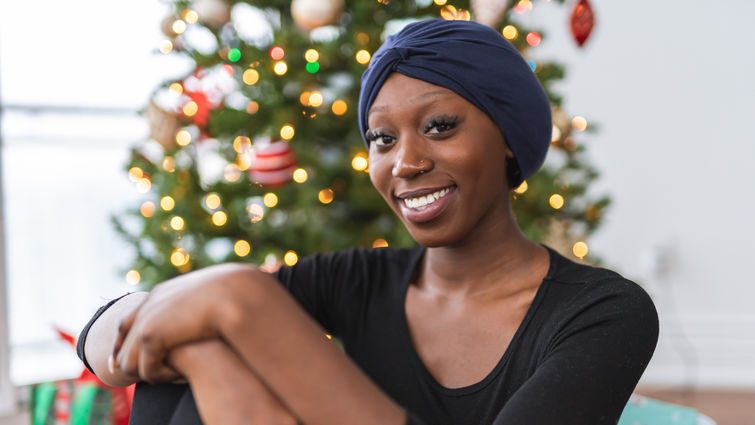
The winter holiday season ushers in a time for gatherings with loved ones and festive activities. During these times, it’s essential for people with cancer who want to maximize time with family and friends to minimize their risk of infection and boost their health, says John Y. Shin, MD, a medical oncologist at Loma Linda University Cancer Center.
“People with cancer can balance the risk of social gatherings with a series of protective measures to arrive at a sweet spot that enables family time in the safest way possible,” says Shin.
Talk to your oncologist about your risk profile
Not all cancer patients are alike regarding the risk for infection, Shin says. Several factors can influence where a patient falls on the risk spectrum for infection — the severity of disease, treatment regimen, genetic differences in the immune system, and lifestyle.
For example, Shin says some breast or prostate cancer patients take hormonal therapy that does not impact the immune system and does not increase their risk for infections. In comparison, some patients with blood cancers may require chemotherapy treatments that severely depress the immune system, making them highly susceptible to infections. Even a common cold can become life-threatening in some cases. Shin says most patients fall somewhere in the middle.
The best way to understand your risk profile is to speak with your oncologist. Working together, you can determine what makes the most sense for your safety regarding holiday plans, Shin says.
Take the usual health precautions
- Avoid meeting with people who are actively sick.
- Practice good hand hygiene.
- Avoid unnecessary exposure to large crowds of people you don’t know.
- Abide by the masking recommendations for your local region. If masking is optional, consider wearing a mask anyway if you’re going to be in a crowded indoor setting with many people. Shin says some patients find mask-wearing an easy intervention and readily do it. However, other patients may feel that wearing a mask impedes their ability to connect socially and emotionally with loved ones. “If you’re not in the highest risk category for infection and you’re taking all necessary health precautions, going without a mask may be a reasonable risk,” Shin says.
Boost your immunity
- Get as much sleep as you can. “Good sleep supercharges your immune system,” Shin says. Studies have shown that losing even one hour of sleep can lower the immune system's effectiveness by up to 50%. For many people with cancer, Shin says reaching the recommended seven to eight hours of sleep proves difficult due to treatment side effects or cancer-related pain. But getting sleep does not employ an “all or nothing” logic, Shin says. Anything you can do to improve your sleep will help you, even if you sleep four hours a night instead of three.
Read: Try these tips to get better sleep
- Soak in sunlight. Exposure to sunlight increases your body’s production of Vitamin D, an essential player in boosting immune health. Research has even linked Vitamin D deficiency with increased risk for various cancers, Shin says. Check with your doctors about whether your medications increase your sensitivity to sunlight. If not, Shin recommends spending 15 minutes in the sun daily.
- Spend time outdoors. Many natural compounds in the air released by plants can boost immunity and improve mood, Shin says. Many cancer patients who feel debilitated and tired spend most of their time indoors between home, vehicles, and clinic visits or hospitalizations. As a result, Shin says their overall exposure to the outdoors surrounded by nature is minimal when it can be very healing. During the holiday season, he advises planning activities outdoors in nature with loved ones.
- Treat food like medicine. Lean toward a whole-food, plant-based diet. “Whole food means minimally processed, and plant-based means nothing that had a mother,” Shin says. “Plants are the only things on the planet that we can eat that help fight cancer and strengthen our immune systems.” Maximizing your intake of plant-based foods will give you an extra boost in the fight against cancer.
Read: Five nutrition tips for patients dealing with cancer
- Practice temperance. Shin encourages enjoying holiday foods and meals but advises practicing moderation to lower your risk of adverse effects from overeating.
Read: What nutritionists want you to know about holiday eating
- Use a positive outlook on life to lower stress. Stress is intimately tied to your mental and emotional state and releases hormones that depress the immune system. Shin says although you cannot control the seeds of thoughts that arise in your mind, you can choose which thoughts to water and nurture. Shin says studies have shown that patients with cancer who focus on life-affirming thoughts revitalize their immune system. As a result, these patients often fare better than anticipated to cancer treatment, report fewer side effects, and benefit from increased survival rates compared to those with negative outlooks. “The most powerful pharmacy in the world is the one that exists between your ears,” Shin says.
- Get vaccinated. Shin advises patients to obtain vaccines for COVID-19, influenza, and age-related vaccines like pneumonia. Talk to your oncologist about the best timing for your vaccines relative to your cancer treatment so you can gain the most benefit in your immune system.
Read: The flu is serious and here’s why this year’s strain poses increased risks
“If you do these things, it will maximize your ability to spend a wonderful time with family while minimizing your risk,” Shin says.
At Loma Linda University Cancer Center, physicians are committed to providing patients with compassionate, comprehensive care that gives them the best opportunity to face and overcome cancer. To learn more about the services offered at the Cancer Center, please visit lluh.org/cancer-center or call 1-800-782-2623.
